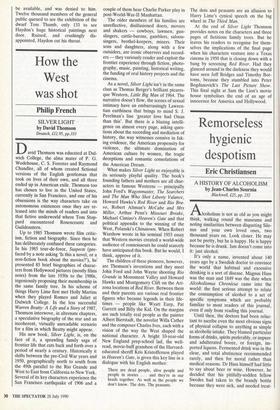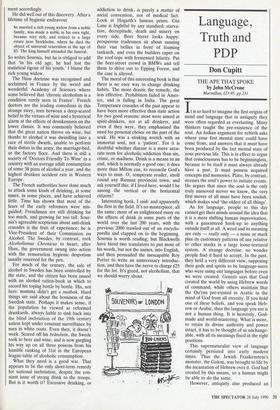Remorseless hygienic despotism
Eric Christiansen
A HISTORY OF ALCOHOLISM by Jean-Charles Sournia Blackwell, £25, pp. 232 Alcoholism is not as old as you might think, walking round the museums and noting similarities between disgusting Sile- nus and your own loved ones, two thousand years on. Look closer. He may not be pretty, but he is happy. He is happy because he is drunk. Ism doesn't come into it: just alcohol.
It's only a name, invented about 140 years ago by a Swedish doctor to convince the world that habitual and excessive drinking is a sort of disease. Magnus Huss was the man and 1849 was the date when Alcoholismus Chronicus came into the world: the first serious attempt to relate the consumption of alcohol to a set of specific symptoms which are probably familiar to most readers of this journal, even if only from reading this journal.
Until then, the doctors had been reluc- tant to ascribe even the most obvious signs of physical collapse to anything as simple as alcoholic intake. They blamed particular forms of drinks, spirits preferably, or impure and adulterated booze, or foreign, im- ported liquors. Fermented drink was in the clear, and total abstinence recommended rarely, and then for moral rather than medical reasons. Dr Huss himself had little to say about beer or wine. However, he decided that his pitifully-sodden fellow Swedes had taken to the brandy bottle because they were sick, and needed treat- ment accordingly.
He did well out of this discovery. After a lifetime of hygienic endeavour
he married a rich young widow from a noble family, was made a noble in his own right, became very rich, and retired to a large estate near Stockholm, where he died the object of universal veneration at the age of 83. The king himself attended the funeral.
So writes Sournia, but he is obliged to add that 'in his old age, he had lost the statistical rigour of his youth.' I blame the rich young widow.
The Huss doctrine was recognised and acclaimed in France by the weird and wonderful Academy of Sciences where some believed that 'chronic alcoholism is a condition rarely seen in France'. French doctors are the leading comedians in this strange story, torn between a deep-seated belief in the virtues of wine and a hysterical alarm at the effects of drunkenness on the lower classes. It was commonly believed that the great nation throve on wine, but thanks to alcohol it was dwindling into a race of sterile dwarfs, unable to perform their duties in the army, the marriage-bed, or the factory floor. And there is still a society of 'Doctors Friendly To Wine' in a country with an average adult consumption of some 38 pints of alcohol a year, and the highest drunken accident rate in Western Europe.
The French authorities have done much to attack some kinds of drinking, at some times, in some places, and have achieved little. Time has shown that most of the fears of the early reformers were mis- guided; Frenchmen are still drinking far too much, and growing far too tall. Sour- nia's agreeable scepticism about anti-drink crusades is the fruit of experience; he is Vice-President of their Commission on Alcohol. The Swedes, by contrast, took Alcoholismus Chronicus to heart; after Huss, the government swung into action with the remorseless hygienic despotism usually reserved for the pox.
For much of the century, the sale of alcohol in Sweden has been controlled by the state, and the citizen has been issued with an alcohol ration-book in which to record his toping bottle by bottle. His, not
hers: mamma didn't get a motbok. Hard
things are said about the bossiness of the Swedish state. Perhaps it makes sense, if the population be viewed as reformed drunkards, always liable to sink back into the blind inebriation of the 19th century unless kept under constant surveillance by
men in white coats. Even then, it doesn't work. Scared off his briindwin, the Swede
took to beer and wine, and is now gargling his way up on all three poisons from his humble ranking of 31st in the European league-table of alcoholic consumption.
What they need is a good war. That appears to be the only short-term remedy for national inebriation, despite the con- stant issue of strong drink to the troops. But is it worth it? Excessive drinking, or addiction to drink, is purely a matter of social convention, not of medical fact. Look at Hogarth's famous prints. Gin Lane is frightful by any standard: starva- tion, decrepitude, death and misery on every side. Beer Street looks happy: prosperous tradesmen sit about sunning their vast bellies in front of foaming tankards, and even the builders caper on the roof-tops with fermented hilarity. Put the beer-street crowd in BMWs and tell them to drive out to Epping Forest, and the case is altered.
The moral of this interesting book is that there is no easy way to change drinking habits. The more drastic the remedy, the less effective. Prohibition failed in Amer- ica, and is failing in India. The great Temperance crusades of the past appear to have been more effective than state action for two good reasons: most were aimed at spirit-drinkers, not at all drinkers, and even if they were, they emphasised the need for personal choice on the part of the soak. He was a stinking wretch with an immortal soul, not a 'patient'. For it is doubtful whether disease is a more accu- rate term for alcoholic addiction than sin, crime, or madness. Drink is a means to an end, which is normally a good one; it does more than Milton can, to reconcile God's ways to man. 0, temperate reader, stroll round any Russian provincial town, and ask yourself this: if I lived here, would I be among the vertical or the horizontal citizens?
Interesting book, I said: and apparently the first in the field. It's no masterpiece, all the same; more of an enlightened essay on the effects of drink in some parts of the world over the last 200 years, with the previous 2000 trawled out of an encyclo- paedia and clapped on to the beginning.
Sournia is worth reading; but Blackwells have hired two translators to put most of his words, but not the names, into English, and then persuaded the inescapable Roy Porter to write an unnecessary introduc- tion, and then have the nerve to charge £25 for the lot. It's greed, not alcoholism, that we should worry about.



















































 Previous page
Previous page